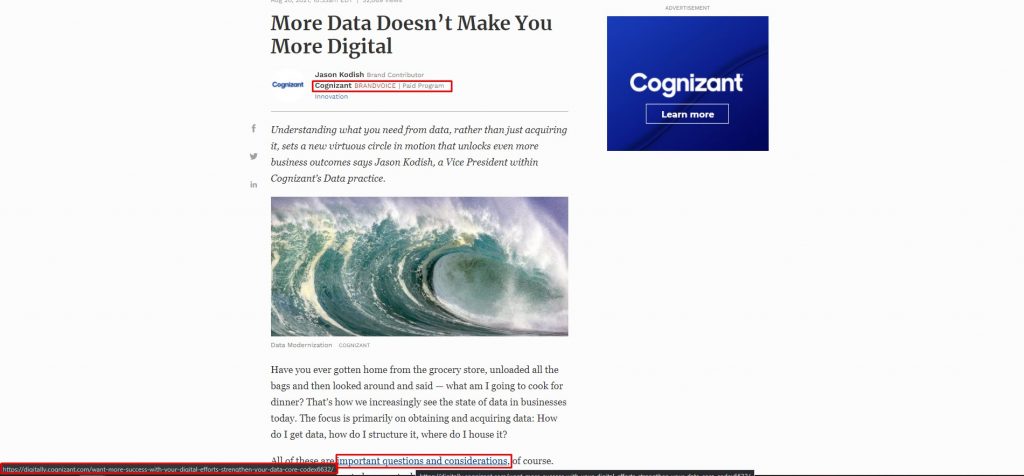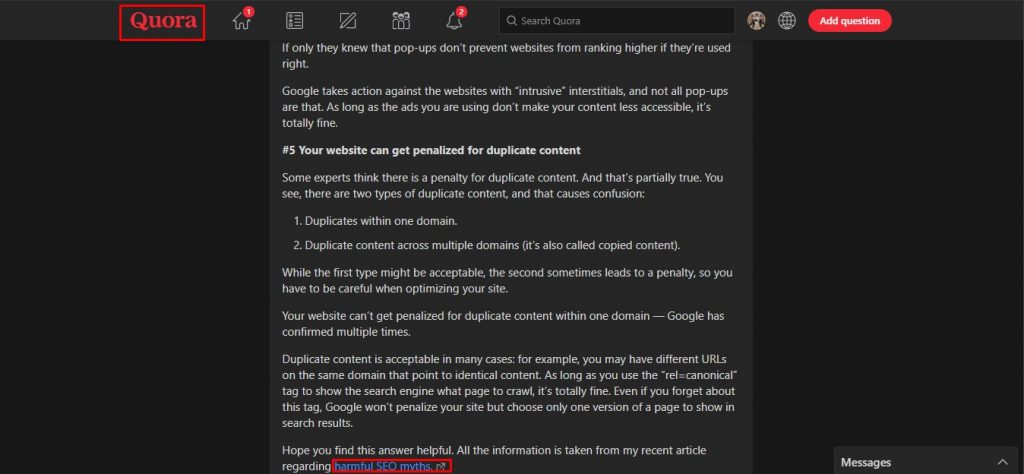Why We Use Google’s New Link Attributes and You Should Too
6 September 2021 Leave a comment ALL-HANDS SEO, LINK EARNING
In the early days of SEO, you could create a poorly optimized page, buy thousands of cheap backlinks, and call it a day. Google would notice a surge in outbound links to the page, assume that it’s valuable, and boost its rankings in search results. Your job was done at that point — you could rest, watching visitors come.
On-page optimization?
What for?
Creating meaningful content?
It’s too hard and time-consuming.
Besides, why invest in on-page SEO and quality content if you can buy a bunch of backlinks and improve your rankings instead?
That’s what many SEO experts thought at the time. And that is the reason why poorly optimized websites often ranked better than those that provided a good user experience and had meaningful content.
Of course, Google couldn’t ignore such an issue, so it started fighting websites that use manipulative link practices.
Let’s remind ourselves of Google’s struggle.
Back in 2005, Google introduced the NoFollow attribute to prevent link spamming across the comments. As you probably know, links marked with rel=”nofollow” don’t pass link juice. Today, all links from blog, social media, and forum comments come with the NoFollow attribute by default, making comment spam a waste of time.
About seven years later, the search engine released the Penguin update. This update deals with websites that manipulate rankings using black-hat link building strategies. It eliminated many dodgy link schemes, including link farms, as Google started looking at the quality of referring domains rather than their quantity.
In September 2019, Google evolved the NoFollow attribute and announced the new Sponsored and UGC link attributes that “provide webmasters with additional ways to identify to Google Search the nature of particular links.” They are supposed to help the search engine spot spammy links even better. But unfortunately for Google, most website owners ignore the new attributes: 99,55% out of 110,000 referring domains don’t use them, as a recent study reveals.
That’s why two years later, when introducing Link Spam, another update to lessen the impact of link schemes, Google reminded us to use the new attributes.
We want to support Google here and devote our today’s article to the importance of these attributes. We believe they have the potential to improve the web and thus shouldn’t be overlooked. And in the following paragraphs, we will explain our point.
You will learn:
- What Sponsored and UGC attributes are intended for.
- When to use them.
- Why using the new attributes may improve your rankings.
- What impact they can have on your business.
Over the years, Google has gotten significantly better at detecting and sunsetting black-hat link building techniques. Its brand new Link Spam update, which was released only a few days ago, enabled the search engine to prevent link spam from affecting search results across multiple languages.
“In our continued efforts to improve the quality of the search results, we’re launching a new link spam fighting change today — which we call the “link spam update.” This algorithm update, which will rollout across the next two weeks, is even more effective at identifying and nullifying link spam more broadly, across multiple languages. Sites taking part in link spam will see changes in Search as those links are re-assessed by our algorithms.”
However, Google’s algorithm still can’t understand the relationship between links on the web. And to help it differentiate one type of link from another and thus identify unnatural linking patterns even more effectively, Google is asking us to use the new attributes.
The rel=”sponsored” attribute should be used to mark links that are advertisements or any other links we got paid for placing.
For example, Forbes has the Paid Program section where it publishes articles from its brand contributors. These posts usually have backlinks to contributors’ websites.
From now on, such links should be marked rel=”sponsored.”
You should add the new attribute to:
- Sponsored links in guest posts;
- affiliate links in content;
- links in ad banners.
As for the rel=”ugc” attribute, it should be used to mark links coming from user-generated content (UGC). It applies to blog comments, forum posts, social media posts, and any other type of content generated by users.
Here is an example of user-generated content with a link on the Quora forum.
So if you have a blog and allow users to leave comments, Google recommends using the UGC attribute instead of NoFollow.
But why does nobody care?
Even though Sponsored and UGC attributes showed up on the radar two years ago, SEOs are still using the NoFollow attribute for all kinds of links.
Sponsored links? — NoFollow.
User-generated content? — NoFollow.
Any other link you don’t want your website to be associated with? — NoFollow.
That is happening because Google allows website owners to use NoFollow as an alternative to UGC and Sponsored attributes.
However, there is a problem. When you mark all types of links with rel=”nofollow,” Google has a hard time analyzing your link profile and can’t process each link type differently. All NoFollow links are the same for the search engine, and it can’t differentiate, say, a NoFollow link in a blog post from a NoFollow link in a user’s comment.
Alternatively, when you specify the new attributes where appropriate, you help Google better understand the relationship between the links on your page.
“Using the new attributes allows us to better process links for analysis of the web. That can include your own content, if people who link to you make use of these attributes.”
But what’s even more important is that it may have an impact on your rankings.
As we said, the new attributes will help Google identify spammy linking patterns more effectively and punish websites that participate in dodgy link schemes.
First off, it will improve the web, as websites with unnatural link profiles that somehow still rank well will experience huge ranking drops. And if those sites go down, your website will go up, assuming that you play by the rules and don’t violate Google’s guidelines regarding link building.
But don’t think that the new update and attributes are all roses. Even though they make the web better, some businesses aren’t happy about them, especially those that rely on guest posting.
If you make money by promoting other companies on your blog, we have bad news for you.
The Sponsored attribute may decrease the number of your customers.
Let us explain.
We all know that Google doesn’t like guest posting aimed at link building. As long as we keep the links in our guest posts nofollow, it’s OK, but when we use DoFollow links, Google devalues them.
Well, the thing is, many of those links remain DoFollow and pass link juice despite Google’s efforts. We know that, and many people who buy guest posts also know that. So when someone purchases a guest post on your blog, their goal is not only to gain exposure for their company but also get a DoFollow link from you. In fact, the latter is often the primary reason for the purchase.
However, with the Link Spam update, the search engine has started to pay even more attention to the issue, as Google’s post on the update implies.
“Another common way sites can monetize is by accepting sponsored and guest posts from other sites. These are articles written by or in the name of one website and published on a different website. In the past, we observed campaigns of low quality sponsored and guest posts primarily intended to gain links.
While we have gotten significantly better at detecting and nullifying such link schemes, we still strongly recommend that site owners apply the appropriate rel values to these links. When we detect sites engaging in either publishing or acquiring links with excessive sponsored and guest posting without proper link tags, algorithmic and manual actions may be applied, similar to affiliate links.”
The algorithmic and manual actions Google is talking about don’t necessarily mean penalties, but it’s clear that the search engine has focused its attention on the issue, so we can expect it to devaluate DoFollow links in guest posts more intensively.
And if they eventually lose their effectiveness, the number of people willing to buy guest posts will dramatically decrease.
The Link Spam update and the new link attributes are just another way for Google to neutralize manipulative link building strategies. And we should admit that as years go by, playing against the rules becomes less and less effective. Of course, some link schemes may still work, but it won’t be long before the search engine evolves to the point where even the dodgiest black-hat techniques lose their effectiveness.
Rest assured, website owners who use manipulative link building practices today will regret it tomorrow. And if you also play unfair, one day, you will wake up, open your rank tracking software, and see how your positions have dropped after another algorithm update.
We’re convinced that only by focusing on content quality and on-page optimization can you achieve long-term SEO success. So play by the rules and don’t forget to use the Sponsored and UGC attributes to help Google make its search results better.
Tags: link building, Link Spam Update, New Link Attributes, Rank Tracker, RankActive
Like this article? There’s more where that came from.
- 5 Questions to Ask Yourself Before Paying for Rank Tracking Software
- 5 Serious Mistakes Beginner SEOs Make and How to Fix Them
- Title and Description in 2021: Why Google Rewrites SEOs’ Meta Tags
- What We Should Learn From Google’s “About This Result” Feature
- Digital Marketer’s Guide to an In-Depth Technical SEO Audit



